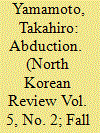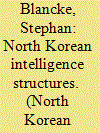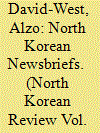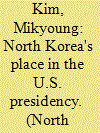|
|
|
Sort Order |
|
|
|
Items / Page
|
|
|
|
|
|
|
| Srl | Item |
| 1 |
ID:
092927


|
|
|
|
|
| Publication |
2009.
|
| Summary/Abstract |
The abduction of 16 Japanese citizens from Japan by agents of the North Korean government took place from 1977 to 1983. In spite of a series of negotiations on this issue between the two countries, little has changed after the return of the five abductees and their family members in 2004. It is high time for Japan to ask such questions as: Has Japan failed? Is it really possible to bring all the abductees back? If not, what went wrong? This paper argues that Japan's massive public relations strategy toward its citizens, although successful in garnering public support, eventually backfired on the government: it left too little room for them to negotiate with North Korea. However, with the attention of the public being diverted from the abduction issue for a while, it may be a good time for Japan to overhaul its negotiation strategy.
|
|
|
|
|
|
|
|
|
|
|
|
|
|
|
|
| 2 |
ID:
092926


|
|
|
|
|
| Publication |
2009.
|
| Summary/Abstract |
Since 2003, a series of Six-Party Talks has attempted to halt North Korea's nuclear development; nonetheless, considering the development of North Korean nuclear capability, the talks are often regarded as an ineffective framework. In order to break through such a situation, first and foremost it is imperative to understand the nature of North Korean foreign policy. In this paper, I argue that North Korean foreign policy can be explained by neoclassical realism: the international distribution of power is interpreted by its domestic political system based on the self-reliance (Juche) ideology and the supreme leader (Suryong) political structure, whose basis is its Confucian culture, and I argue that this perception has predominantly determined its foreign policy decision-making.
|
|
|
|
|
|
|
|
|
|
|
|
|
|
|
|
| 3 |
ID:
092933


|
|
|
|
|
| Publication |
2009.
|
| Summary/Abstract |
The Kaesong Industrial Complex (KIC), one of four special economic zones in North Korea, is an industrial park located in North Korea, just across the Demilitarized Zone (DMZ) from South Korea.2 The KIC stands out because, in recent years, the other three zones have become dysfunctional for all practical purposes. As of the end of 2008, 93 South Korean firms operated in the KIC, with a total of 38,931 North Korean workers along with 1,055 South Korean workers. The project was supposed to be carried out in three stages for years to come; the first stage was well under way and was expected to be completed in 2010. The complex was supposed to employ 100,000 North Korean workers and have 450 tenant companies by the end of 2010. However, such rosy projections about the KIC ended when North Korea cut the reconciliation dialogue with South Korea after its conservative president, Lee Myongbag, took office in February 2008. The purpose of this paper is to discuss a number of key points on the KIC in the context of inter-Korean economic cooperation, along with reasons for the U.S. interest in the KIC.
Special note: We completed this paper before North Korea and the United States began to take a series of new hardline actions against each other. However, the basic tone of this paper, an optimistic one, is likely to prevail in the long run because no one wants another Korean war and North Korea is unlikely to collapse any time soon.
|
|
|
|
|
|
|
|
|
|
|
|
|
|
|
|
| 4 |
ID:
092928


|
|
|
|
|
| Publication |
2009.
|
| Summary/Abstract |
The last six-party talks ended in December 2008. The inactive period coincided with a serious recession in the United States that led to annual budget deficits for fiscal years 2008-2009 and 2009-2010 that easily exceeded $1 trillion. The United States will not be in a position to offer meaningful economic concessions to North Korea. Further, the removal of North Korea by the United States from the list of state sponsors of terrorism in 2008 is symbolic because there are numerous other sanctions still in effect against North Korea. The road map toward successful negotiations will have to be composed of comprehensive plans in which both North Korea and the United States can see what the ultimate outcome of their concessions is likely to be.
|
|
|
|
|
|
|
|
|
|
|
|
|
|
|
|
| 5 |
ID:
092931


|
|
|
|
|
| Publication |
2009.
|
| Summary/Abstract |
For over half a century, the Korean Peninsula has posed a foreign-policy dilemma for every American president. During this time, continuity, rather than change, has been the prevailing characteristic of U.S. foreign policy. The recent Bush administration, in relation to its policy towards North Korea, was characterized by its dualism - believing in the same goal, but divided over goal achievement actions. Unfortunately, the internal division of policy at home has resulted in the North Korean nuclear issue being in a worse shape today than it was eight years ago after the Clinton-Bush regime change. After President Bush refused to follow Clinton's engagement path, North Korea significantly increased its plutonium stockpile, tested nuclear bombs and announced itself a "nuclear weapons state." President Barack Obama has inherited difficult issues and initiatives not only on the home front but also internationally. The new Obama administration is inundated with a plethora of policy issues ranging from economics to foreign policy. In the past few years, many experts in North Korean policy have juxtaposed various strategies that have been used and should be included with relation to North Korea. This paper will underline motives for North Korea's actions, updates of previously communicated policy options with real-time information, and offer a unique twist, with truths that are often overlooked, on how they should be implemented in the new Obama era, moving forward.
|
|
|
|
|
|
|
|
|
|
|
|
|
|
|
|
| 6 |
ID:
092925


|
|
|
|
|
| Publication |
2009.
|
| Summary/Abstract |
The North Korean intelligence structures still seem to be an enigma to Western intelligence analysts. Only a few incidents are reported in the media; these are mostly connected to criminal activity and are sometimes based on dubious assumptions. A rather disregarded field of North Korean intelligence is what I call "sub-intelligence." This parameter includes information brokerage, business intelligence, "front" companies, hackers, organized crime, ethnic communities, and so on. It is a global network of intelligence-related subjects that are used by the North Korean government and its huge intelligence bureaucracy. They often occupy simultaneous multiple positions in the security and civilian sectors, which complicates their tracing by Western intelligence.
|
|
|
|
|
|
|
|
|
|
|
|
|
|
|
|
| 7 |
ID:
092935


|
|
|
|
|
| Publication |
2009.
|
| Summary/Abstract |
This section contains an overview of major North Korea-related developments between December 2008 and May 2009. Newsbriefs include information on the renewed six-party talks (December), the ongoing deterioration of inter-Korean relations (January), the emergence of Kim Jong-un as a possible successor of Kim Jong-il (February), the detainment of American journalists Laura Ling and Euna Lee (March), the North Korean claim of a successful satellite launch (April), the second North Korean nuclear test and declaration of a state of war (May), and the voiding of all Kaesong Industrial Complex contracts (May). North Korean Review consulted online news media for information in this section.
|
|
|
|
|
|
|
|
|
|
|
|
|
|
|
|
| 8 |
ID:
092929


|
|
|
|
|
| Publication |
2009.
|
| Summary/Abstract |
Foreign policy behavior is a function of combined elements such as strategic calculations, institutionalized mechanisms, interactive constructed identity, and transaction/opportunity costs. The top leaders' connectivity serves as an intervening variable in the process. The personal connection, of course, cannot show the whole picture of behind-the-curtain dynamics, and yet it still is a piece of the puzzle in explaining "why it happened the way it happened." This article, an inductive analysis of narratives, explains why the current nuclear impasse emerged at the end of the Clinton administration and how the George W. Bush administration chose to dismiss the Kim Jong Il regime as a legitimate counterpart by focusing on cultural elements of the top leaders' ethos and worldviews.
|
|
|
|
|
|
|
|
|
|
|
|
|
|
|
|
|
|
|
|
|